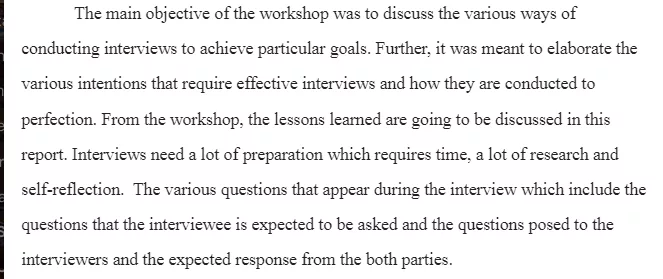Conducting Effective Interviews
Conducting Effective Interviews
General Overview Tips
Interview preparation takes time, research, and self-reflection. This sheet can be used as a guideline as you prepare your thoughts and responses for a position in your desired industry.
Quick tips to remember are:
- Take time to reflect on your strengths and skills as a professional
- Apply research about company and industry toward preparing your responses
- Put all of your broad interests and values into a context to give interviewer a reference point
- Stand behind your response and don’t just respond with what you think the interviewer would like to hear
- Be sincere and genuine in your responses in order to develop a back and forth dialogue
Top Five Common Interview Questions
- “Tell Me About Yourself”
- Perspective: Start from a current perspective and orient the interviewer – “Recently graduated from DePaul University with a Bachelors Degree in Accounting”
- Current Experience: Add a bit of current experience – “I was able to have a strong internship experience at Baxter International…”
- Professional Interests: Share a bit of your professional interests – “I have always been interested in positions and companies that allow for opportunities to be collaborative on projects, work with international markets, etc”
- Outside Interests: Identify external interests that make you well rounded – “In addition to my professional interests, I volunteer at PAWS when I can”
- “What are your strengths and weaknesses?”
- Technical and Broad Strengths: Share specific strengths – “I feel that I am strong in problem solving and taking ownership of projects.”
- Identify a Context: Enhance strengths with context – “I have always enjoyed building new relationships and I had the opportunity to grow our client base at Winston Enterprises through their College Campus Outreach Program.”
- Plan of Improvement: Be proactive to share how you will improve– “Being a new professional who recently graduated, I know that I have to build my experience in x, and I had hoped to do that through professional development and working with veteran professionals in “x” area.”
- “Can you share your professional short and long term plans?”
- Identify Strengths with plans: Identify how you will apply and enhance skills further – “I would like to continue to strengthen my project management skills that I gained in my internship”
- Growth: Identify how you would like to grow in position you are applying for
- Area of Specialty: Identify specialties in the industry that you would like to explore later
- Outlook and exploration: Frame long term plans in a broad way not in terms of another position in company – “Long term, I would like to take on more responsibility, perhaps manage several projects, and continue to obtain certifications through professional development”
- Additional education: If appropriate, identify advanced degrees or certifications that can benefit company and position for long term plans
- “Why are you interested in this company?”
- Research: Stand behind a genuine interest in the company and how it relates to you
- Reputation: Think about how the reputation of company impacted your decision
- Specialization: Expand on your specific interest in the position
- Work Culture: Is there an aspect of the work culture in this company that appealed to you?
- Relationships: Think about this company’s relationship to local, national, and international relationships
- Partnerships: Are there partnerships or collaborations with the company that peaked your interest to apply?
- “Why Should I Hire You?”
- Strengths: Continue to identify your strengths and how they can benefit position
- Unique Qualities: Identify what might be unique about you as a candidate
- Areas of Support: What areas of the organization can you support?
Answer Preview-Conducting Effective Interviews

$5.00
